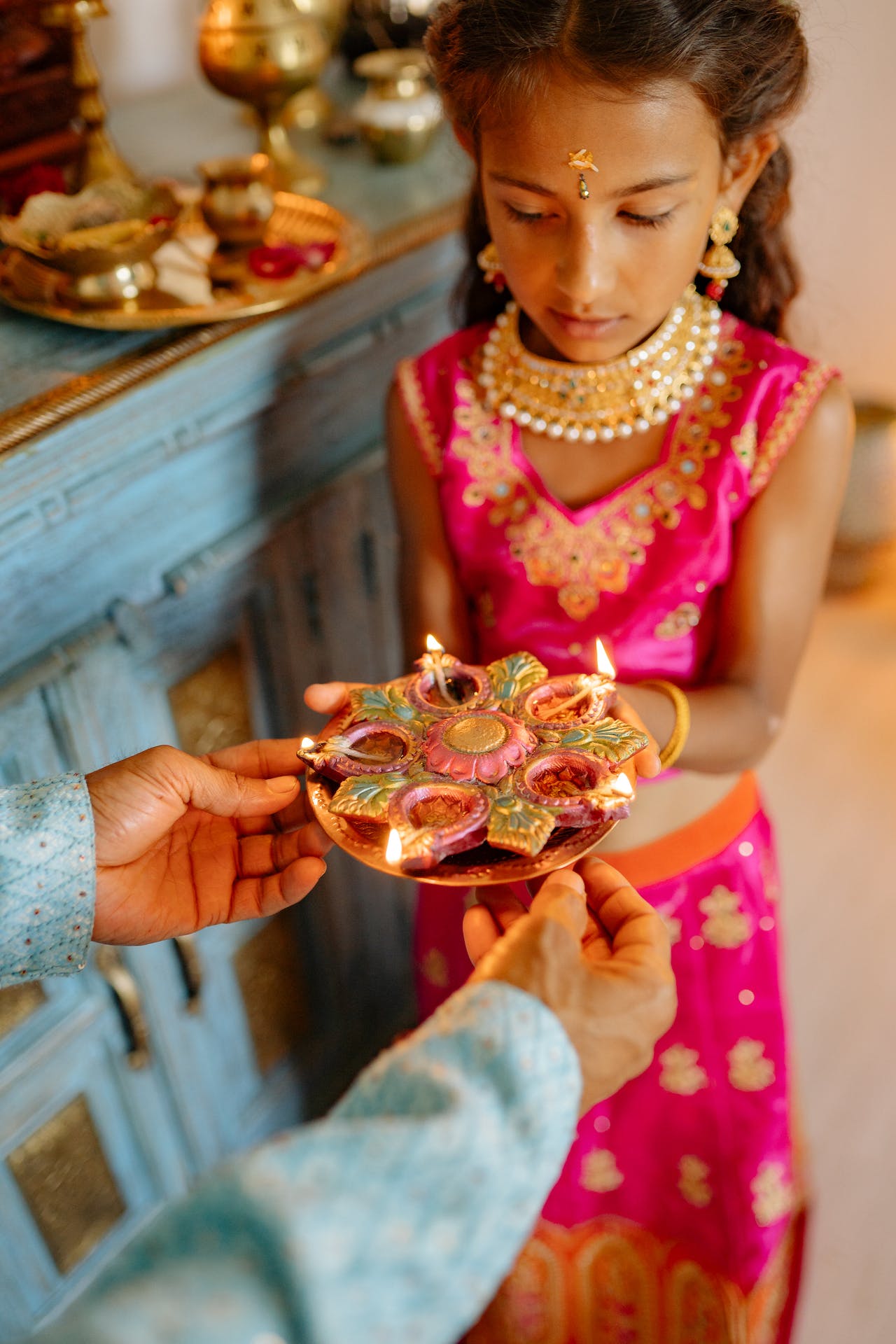Diwali and Personal Finance Lessons
Key Takeaways
- Cleaning up and decluttering our houses (both residential and financial) is critical.
- It is essential to keep track of our income expenses and stay within budget. Start anew every year.
- Respecting and appreciating our wealth physically goes a long way in building a positive relationship with money.
- To brighten our path toward financial prosperity, we must constantly keep the flame of financial literacy knowledge alive. It’s like lighting that diya of wisdom.
- The joy of giving is just as important as receiving.
Diwali, one of the most awaited festivals in the Hindu calendar, is upon us. The 5-day festival, marking the start of the Hindu New Year, is celebrated by over 1 billion people. The festival primarily signifies the victory of good over evil and the importance of knowledge and self-awareness over ignorance. In addition, some families also celebrate Diwali to honour Goddess Lakshmi, the Goddess of Wealth. While each family has its tradition of celebrating Diwali, there are some common themes. These include cleaning the house, exchanging gifts, charity, lighting diyas and fireworks. Diwali and personal finance are intertwined tightly. As I grew, I realized how each aspect of Diwali gives us a valuable lesson towards our financial prosperity journey. Interestingly, these lessons apply to adults alike. Let us look at some of the themes and lessons that one can take from Diwali.
Cleaning up Your House
Getting ready for Diwali is not just about the five days of celebration; it starts way in advance. Long before Diwali arrived, most families, including mine, started decluttering their homes, cleaning them and giving them a fresh coat. Why? Because they want to welcome Goddess Lakshmi, who, it is believed, only visits clean and well-lit houses. Now, let’s draw a parallel between this Diwali tradition and personal finance. You’ll soon see that cleaning up our finances is one of the first steps toward achieving financial prosperity.
Just like we tidy our homes, we must declutter and clean up our financial house. For our children, this might mean recognizing and planning to avoid habits that go against sound financial principles. As an example, if your child consistently spends more than their allowance, it is time for them to clean up their act and start budgeting.
For young adults, it’s about clearing out those high-interest debts, such as student loans and setting goals for saving and investing. This will help them get their financial house in order. For us adults, cleaning up our financial portfolio involves taking a close look at our assets, liabilities, and investments. We need to assess what we have and what we need to achieve our financial goals.
In essence, much like preparing for Diwali by cleaning our homes to welcome Goddess Lakshmi, cleaning up our finances sets the stage for a brighter financial future for our families and children. So, let’s roll up our sleeves and start decluttering our financial house!
Keeping Track of Your Finances
Every Diwali, I have a vivid memory of our evening prayer. Long before the era of finance apps, Excel and Google Sheets, my father had a ritual. He would reverently take out his bright-coloured red ledger book and pray to it, along with the pen he used. As I grew older, I discovered the information within those pages. That book contained a comprehensive record of all his income sources and expenses. This included his salary, investment income, allowance to helpers, significant purchases and household expenses.
Luckily, or unluckily (depending on how you see it), we don’t have to rely on books. We have apps (such as this for teenagers) now to keep track of these things. However, the crux remains the same – keeping track of our finances is critical. This is an essential step in our journey towards financial prosperity.
Tracking our income and expenses is the compass that keeps us on budget. Furthermore, this helps us steer away from unnecessary debt and financial stress. Cultivating this habit during the formative teenage years can have a profound impact on the financial journey of our children. By instilling this practice early on, budgeting becomes second nature to them as they mature into responsible adults capable of leading independent lives.
Even for those who may not have embraced this practice in the past, Diwali offers a unique opportunity. It symbolizes a fresh start and an auspicious moment to begin tracking your finances. So, whether you’re just starting or looking to recommit to this essential habit, seize the festival’s energy to embark on your financial-tracking journey. Your future self will thank you for it.
Respect and Appreciate Our Wealth
Lakshmi Pooja (Prayer of Goddess Lakshmi) on the day of Diwali is another ritual tightly coupled with the festival. In my house, on the day of Diwali, my parents will gather physical cash and assets such as gold or silver jewellery and offer prayers to those. This act of showing gratitude and honouring actual physical assets had a profound impact on me and established a foundational link between Diwali and personal finance.
Through this meaningful act, we learn to understand and truly appreciate the worth of what we have. It’s a powerful reminder of respecting and cherishing our wealth, assets, and money. This heightened awareness encourages us to make wise choices in growing our resources. By nurturing a positive and wholesome relationship with our financial assets, we pave a smoother path to financial prosperity. It’s not just a Diwali ritual; it’s a lifelong practice. This reminds us to value what we have and continue nurturing it for a brighter financial future.
Lighten Up Your Life With The Lamp of Financial Literacy
Diwali is a time when every household is adorned with a beautiful display of diyas, those enchanting oil lamps that illuminate our homes. Spiritually, they symbolize lighting the way for the divine to enter our lives. But there’s another layer of meaning to these diyas – they represent knowledge. Just as the glow of a diya is endless, knowledge, too, is an endless journey. Drawing inspiration from this aspect of Diwali, we can apply it to our personal finance journey.
To brighten our path toward financial prosperity, we must constantly keep the flame of financial literacy knowledge alive. It’s like lighting that diya of wisdom. Equipping ourselves and our children with financial literacy skills is the spark that sets our prosperity journey aglow. But here’s the key: we must start early and never stop learning.
For children, this means introducing them to age-appropriate financial concepts. Teach them the basics of budgeting, helping them distinguish between needs, wants, and the importance of saving. They should also learn about financial products like debt, credit, and debit cards. Make it interactive through tools and conversations. This lays the foundation for their financial future.
Just as those diyas illuminate our homes during Diwali, knowledge illuminates our lives. It’s a continuous journey, one that can start during childhood and serve as a guiding light toward a brighter financial future. So, let’s ignite the diya of financial literacy and keep it shining for our family’s prosperous tomorrow!
Diwali and The Joy of Giving
Each year, our family would set aside a portion of our Diwali budget to purchase essential items like groceries, clothes, and blankets. These would go towards the underprivileged in our community. As a family, we would distribute these gifts to those in need. This act of charity was a cherished part of our Diwali celebrations. It taught us the true essence of the festival, where the joy of giving was just as important as receiving. These experiences, year after year, made us appreciate the power of small acts of kindness. We also realized the difference these small acts can make in the lives of others.
For children, this tradition of sharing and spreading happiness during the festival is a powerful lesson. It’s about teaching them that true wealth isn’t just money and possessions but the joy of making others happy. Doing this will help us in leading a fulfilling life.
Incorporating charitable activities into your family’s Diwali traditions can be an excellent way to instill the joy of giving. Whether donating to a local charity, volunteering together, or organizing a collection for those in need, these experiences can leave a lasting impact on your children. It not only teaches them the value of generosity but also fosters a sense of gratitude for what they have.
By embracing the joy of giving and passing it on to the younger generation, we contribute to raising socially responsible individuals. These individuals not only flourish financially but also make a positive impact on the world. Diwali, focusing on sharing and caring, is the perfect opportunity to begin this beautiful journey of giving with our children.


Leave a Reply